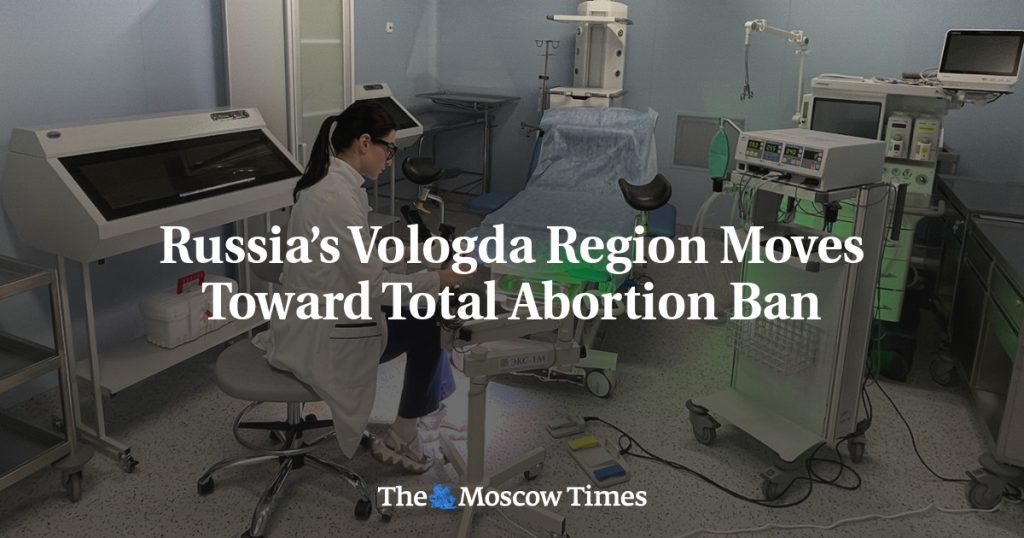Vologda Region Considers Historic Abortion Ban in Russia
Authorities in the Vologda region of northwestern Russia are exploring a groundbreaking proposal to ban abortions in both state-run and private clinics. If approved, this measure would make Vologda the first region in Russia to impose a total ban on abortion services. Governor Georgy Filimonov announced that local officials plan to discuss the initiative with representatives from public and private medical institutions later this month. Filimonov emphasized that the discussions will focus on the need to refuse abortions even in private clinics, signaling a significant shift in the region’s approach to reproductive rights.
The initiative is being developed in collaboration with public organizations, state institutions, and the Russian Orthodox Church, highlighting the strong societal and religious influences behind the proposed ban. This move comes amid broader efforts in Russia to address demographic challenges, as the country faces a declining population and low birth rates. While the proposal is still in the discussion phase, it has already sparked debate over reproductive rights and the role of government in personal healthcare decisions.
The Role of the Russian Orthodox Church and Public Opinion
The involvement of the Russian Orthodox Church in the Vologda region’s proposed abortion ban underscores the deep interconnections between religion, politics, and social policy in Russia. The Church has long advocated for conservative family values and has been a key player in shaping public opinion on issues like abortion. By collaborating with religious leaders, the Vologda regional government is tapping into a powerful cultural force that resonates with many Russians.
However, the proposal has also raised concerns among women’s rights advocates, who argue that such a ban would infringe upon women’s autonomy and access to safe reproductive healthcare. Critics point out that restricting abortion services could lead to an increase in unsafe, illegal procedures, jeopardizing women’s health and lives. The debate highlights the tension between religious and cultural traditions and the need to protect individual rights in a modern society.
National Context: Abortion Laws and Demographic Challenges
While the Vologda region’s proposed abortion ban is a local initiative, it reflects broader trends in Russia’s approach to reproductive rights. At the national level, Russia maintains relatively liberal abortion laws, allowing women to terminate pregnancies up to 12 weeks. However, in recent years, several regions have introduced local restrictions, such as fines for "coercing" women into abortions, as part of efforts to boost birth rates.
President Vladimir Putin has encouraged women to have more children while cautioning against imposing strict legal restrictions on abortion access. This nuanced stance reflects the government’s dual goals of addressing demographic decline and avoiding widespread public backlash. Despite these efforts, the country’s population continues to shrink, prompting regional governments like Vologda’s to explore more drastic measures.
The Rise of Regional Abortion Restrictions
The Vologda region is not alone in its efforts to restrict abortion access. At least nine Russian regions have already halted abortion services in private clinics, and at least 15 regions have introduced fines for individuals or organizations accused of "coercing" women into terminating pregnancies. These measures are part of a broader campaign to promote traditional family values and increase birth rates.
While the national government has not outright banned abortions, the growing number of regional restrictions suggests a shift toward more conservative policies on reproductive rights. This trend has raised concerns among human rights organizations, which argue that such measures disproportionately affect vulnerable women and undermine their ability to make informed choices about their health and futures.
A Message from The Moscow Times: The Fight for Independent Journalism
The Moscow Times, an independent news outlet, has faced increasing pressure from Russian authorities, who have labeled the organization as "undesirable" and a "foreign agent." These designations criminalize the outlet’s work and put its staff at risk of prosecution. The Moscow Times has refused to be silenced, continuing to provide unbiased reporting on Russia despite the challenges.
The outlet has called on readers for support, emphasizing the importance of independent journalism in holding power to account. By supporting The Moscow Times, readers can help defend press freedom and ensure that accurate, unbiased information remains accessible in Russia. This effort is particularly critical in the context of debates over reproductive rights, where informed public discourse is essential.
Conclusion: The Broader Implications of Vologda’s Abortion Ban Proposal
The proposed abortion ban in the Vologda region is more than a local policy initiative; it represents a microcosm of the larger debate over reproductive rights, religious influence, and demographic challenges in Russia. While the ban is still under discussion, its potential approval could set a precedent for other regions to follow suit, further restricting access to abortion services nationwide.
The initiative also raises important questions about the role of government in personal healthcare decisions and the balance between cultural traditions and individual rights. As the debate unfolds, it will be crucial to consider the voices of women, healthcare providers, and human rights advocates, ensuring that any policy changes prioritize the well-being and autonomy of those most affected.
In the broader context of Russia’s












